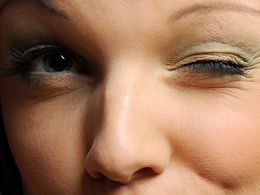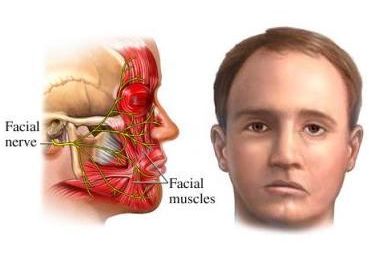Left Eye Twitching
Have you experienced left eye twitching? If so, what does it mean when your left eye twitches? Keep reading and you will find answers of why your left eye twitches and what to do about it.
- My Left Eye Keeps Twitching – Why?
- Left Eye Twitching Superstition
- Types of Left Eye TwitchingCommon
- Causes of Left Eye Twitching
- When to Seek Help for Left Eye Twitching
- Treatments for Left Eye Twitching
- Home Remedies for Left Eye Twitching
My Left Eye Keeps Twitching – Why?
Left eye twitching, also known as blepharospasm, is characterized as an uncontrollable and recurring spasm of your upper eyelid. Eye twitching can occur in both the left and right eye, although it is most common in the left eye. If you suffer from left eye twitching, you may experience involuntary eyelid spasms that recur every few seconds for a minute or two. It is important to note that most people experience a left eye twitch at some point in their life.

A woman with her left eye twitching
A twitching left eye is usually non-life-threatening and painless. In addition, left eye twitching usually subsides on its own without medical intervention, but it can be quite bothersome, especially if the eye spasms are strong enough to cause your eyelids to constantly close and reopen. In some cases, eye spasms can result in chronic twitching of the left eye. Chronic upper left eye twitching can lead to eye spasms that occur frequently throughout the day. These twitches may persist for days, weeks, or sometimes even months. Although the condition is physically painless, it can cause considerable psychological and/or emotional distress, especially if it lasts too long and/or interferes with your quality of life.
In severe cases, chronic left eye twitching can lead to constant squinting and winking, problems keeping your left eye open and/or permanent visual impairments. Chronic left eye twitching may also occur as a result of an eye condition like chronic dry eyes, inflamed eyelids, pinkeye, eye strain and/or light sensitivity. Although rare, left eye twitching can be an early sign of serious nerve and/or brain condition like Tourette’s syndrome, Bell’s palsy, Parkinson’s disease and/or dystonia. Medications typically used to treat epilepsy and psychosis can also cause twitching of the left eye.
Left Eye Twitching Superstition
Left eye twitching has been associated with numerous superstitions. A common Chinese left eye twitching superstition is that you will receive good news and/or good luck in the near future. This superstition is in direct contrast to right eye twitching which predicts that you will receive bad news and/or bad luck in the future. In addition, lower left eye twitching means either something or someone will make you cry soon and/or someone is gossiping about you.
Types of Left Eye Twitching
There are three common types of upper left eye twitches:
- Minor left eyelid twitches
- Benign left eye blepharospasm
- Hemifacial left eye spasms
Minor left eye twitches are usually associated with lifestyle factors like:
- Stress
- Fatigue
- Insomnia
- Alcohol and caffeine use or abuse
Irritation of your eye’s (cornea) surface and/or inflammation of your left eyelid’s membranous lining (conjunctiva) can cause minor left eyelid twitching. In some cases, the exact cause of twitching in the left eye is unknown, but in the majority of cases, this type of left eye twitching is harmless. Minor left eye twitching usually resolves on its own without medical treatment. Benign left eye blepharospasm, on-the-other-hand, typically arises during middle-to-late adulthood, worsening over time. This form of left eye twitching tends to occur more often with women than men. Although it is not a life-threatening condition, it can interfere with your daily functioning.
Benign left eye blepharospasm typically begins with eye irritation and/or chronic eye blinking. As the condition progresses, you may experience an increase in light sensitivity, facial spasms and unclear vision. In severe cases, your left eye spasms may become so forceful that your left eyelid remains closed for several hours at a time. A combination of genetic and environmental factors appears to play a role in the development and progression of this form of left eye twitching.
Hemifacial left eye spasms typically consist of more than just your left eyelid muscles. This form of left eyelid twitching also involves the muscles around your mouth and only affects one side of your face. This condition tends to occur when irritation and/or inflammation causes an artery to press on your facial muscle nerves.

Hemifacial left eye spasms
Common Causes of Left Eye Twitching
- Fatigue: Insomnia can trigger left eye spasms.
- Stress: A common sign of stress is left eye twitching. Tense muscles can cause left eye jumping.
- Caffeine and alcohol: Too much caffeine and/or alcohol can trigger left eye twitches.
- Eye strain: The need for glasses or a change in eye prescription can cause twitching in your left eye. In this case, your left eye may be overworked, causing your upper left eyelid to repeatedly contract and release. Staring at a computer, tablet and/or smartphone screen for too long can cause left eye twitching.
- Vitamin Deficiencies: Nutritional deficiencies (magnesium, calcium, etc.) can trigger left eye twitching.
- Dry eyes: Dry eyes can cause left eye twitching. Almost everyone will experience dry eyes as they age. Dry eyes is also common with people who stare at computer screens for long amounts of time, take certain medications (antidepressants, antihistamines, steroids, etc.), consume caffeine and/or alcohol and wear daily contact lenses.
- Allergies: If you have allergies, you may experience left eye twitches. Allergies can cause your left eye to be itchy and watery, which can prompt you to rub it. When your left eye is rubbed, it causes your body to releases histamines into your eyelid tissues which then causes left eye twitching.
Video – Is there anything I can do when my eyelid twitches?
When to Seek Help for Left Eye Twitching
You should see an eye doctor if you have:
- Left eye twitching that persists for more than one week
- Left eye twitching that completely closes your left eyelid
- Left eye spasms that involve a variety of facial muscles
- Left eye that is swollen, inflamed, red and/or watery
- A sagging upper left eyelid
Treatments for Left Eye Twitching
In many cases, minor left eye twitches disappear with rest and a reduction in alcohol and/or caffeine consumption. It is important to note that this condition does not occur while sleeping. If you believe that your dry eye is irritating your cornea (eye) and causing your left eye to twitch, treat it with over-the-counter artificial tears. Although there is no cure for benign left eye twitching at this time, several alternative treatments, home remedies and prescriptions medications can provide relief for this condition.
The most common treatment for benign left eye blepharospasm is botulinum toxin, also known as Botox. Botox has only shown success in 15% of left eye blepharospasm cases. Moreover, Botox only provides temporary relief. It is an effective treatment if you suffer from a hemifacial left eye twitching. In this case, when Botox is injected into your left eye muscle, it reduces and/or eliminates your eye spasms for several months. It is important to note that even in this case, the effects are temporary and the injections must be repeated.
In mild cases of benign left eye blepharospasm, your physician may recommend the following medications:
- Lorazepam
- Clonazepam
- Trihexyphenidyl
Alternative treatments for benign left eye blepharospasm include:
- Acupuncture
- Hypnosis
- Biofeedback
- Nutrition therapy
- Chiropractic
When traditional treatments fail, your physician may recommend surgery. Approximately 80% of those with benign left eye blepharospasm benefit from a myectomy, a neurosurgical procedure in which several of your eyelid muscles and nerves are removed.
A myectomy is also beneficial for those who have hemifacial left eye spasms because the procedure reduces the amount of pressure placed on your facial nerves. This surgery usually produces long-lasting results, but it can also lead to serious and sometimes life-threatening side-effects and complications.
Home Remedies for Left Eye Twitching
Rest: If you experience left eye twitching, it may be time for you to get some much needed rest. Overworked and overstressed left eye muscles accompanied by physical fatigue can cause left eye jumping. Make sure you get at least 8 hours of sleep each night. Take several 15-minutes breaks, every couple of hours. Put down your book and walk around or look away from a computer or television screen. When your left eye spasms, go into a dark room and/or close your eyes so that they can get a much needed break.
Lubricating Eye Drops: If you left eye twitches, purchase over-the-counter saline eye drops. Many times, left eye twitching is caused by dry eyes so artificial tears and/or saline eye drops may relieve annoying eye spasms. Apply the eye drops three to four times a day.
Stress Reduction Techniques: You may notice that your left eye twitches when you are stressed. If so, then you are correct – stress can trigger left eye twitching. Alleviate your left eye spasms by practicing stress reduction techniques (yoga, meditation, exercising, deep breathing, etc.). These activities will not only relax you and help you manage your stress; they will also reduce left eye twitching.
Calcium and Magnesium: Foods rich in calcium and magnesium can help ease left eye twitching. These essential minerals not only support healthy neurological functions, they also aid in muscle control. If you decide to take calcium and magnesium supplements, do not take more than 400 mg of calcium and 200 mg of magnesium per day. Consult your physician before ingesting supplements.
Limited Caffeine and Alcohol Consumption: If your left eye keeps twitching, reduce your caffeine and alcohol consumption. Caffeine can stimulate your left eye muscles and cause it to spasm. Ease left eye twitching by limiting the amount of caffeine (coffee, tea and soda) and alcoholic beverages you consume.
Water: If you can’t get your left eye to stop twitching, drink more water. As mentioned previously, dehydration can cause left eye muscle spasms. Drink approximately 64 oz. (8 glasses) of water a day to reduce left eye twitching.
Ice: Although this may sound unconventional, applying ice to your twitching left eye can actually lessen or stop your eye spasms. Apply ice to your left eye to relax the area. Do not place the ice directly on your eye because the extreme temperature can burn your skin. Put the ice in a towel and place it over your left eye until is stops twitching.
References:
Dubow, B. (2012). Eye twitching and eyelid twitches. All About Vision. Retrieved from http://www.allaboutvision.com/conditions/eye-twitching.htm
Mayo Clinic. (2013). Eye twitching: Causes. Retrieved from http://www.mayoclinic.com/health/eye-twitching/MY00102/DSECTION=causes
Medline Plus. (2013). Eyelid twitches. Retrieved from http://www.nlm.nih.gov/medlineplus/ency/article/000756.htm
Solanki, P. (2013). Left Eye Twitching Superstition. Buzzle. Retrieved from http://www.buzzle.com/articles/left-eye-twitching-superstition.html
-
Advertisement

 Facebook
Facebook  Twitter
Twitter  RSS
RSS







